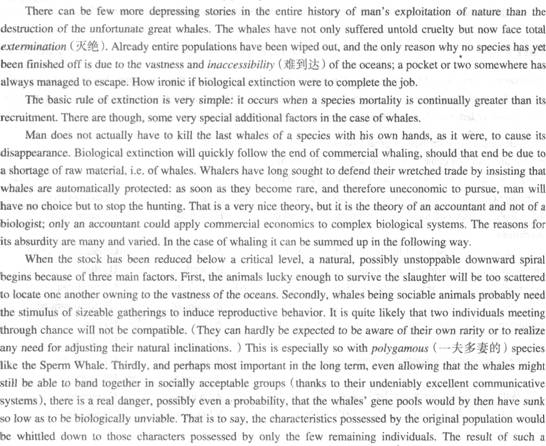es in its way may well boost its creativity. [A] Jack White, the former frontman of the White Stripes and an influential figure among fellowmusicians, likes to make things difficult for himself. He uses cheap guitars that wont stay in shape orin tune. When performing, he positions his instruments in a way that is deliberately inconvenient, sothat switching from guitar to organ mid-song involves a mad dash across the stage. Why? Becausehes on the run from what he describes as a disease that preys on every artist: "ease of use". Whenmaking music gets too easy, says White, it becomes harder to make it sing. [ B] Its an odd thought. Why would anyone make their work more difficult than it already is? Yet weknow that difficulty can pay unexpected dividends. In 1966, soon after the Beatles had finished workon "Rubber Soul", Paul McCartney looked into the possibility of going to America to record theirnext album. The equipment in American studios was more advanced than anything in Britain, whichhad led the Beatles great rivals, the Rolling Stones, to make their latest album, "Aftermath", in LosAngeles. McCartney found that EMIs (百代唱片) contractual clauses made it prohibitively expensiveto follow suit, and the Beatles had to make do with the primitive technology of Abbey Road. [C] Lucky for us. Over the next two years they made their most groundbreaking work, turning therecording studio into a magical instrument of its own. Precisely because they were working with oldofashioned machines, George Martin and his team of engineers were forced to apply every ounce oftheir creativity to solve the problems posed to them by Lennon and McCartney. Songs like"Tomorrow Never Knows", " Strawberry Fields Forever", and "A Day in the Life" featuredrevolutionary sound effects that dazzled and mystified Martins American counterparts. [D] Sometimes its only when a difficulty is removed that we realise what it was doing for us. For morethan two decades, starting in the 1960s, the poet Ted Hughes sat on the judging panel of an annualpoetry competition for British schoolchildren. During the 1980s he noticed an increasing number oflong poems among the submissions, with some running to 70 or 80 pages. These poems were verballyinventive and fluent, but also "strangely boring". After making inquiries Hughes discovered that theywere being composed on computers, then just finding their way into British homes. [E] You might have thought any tool which enables a writer to get words on to the page would be anadvantage. But there may be a cost to such facility. Ifi an interview with the Paris Review Hughesspeculated that when a person puts pen to paper, "you meet the terrible resistance of what happenedyour first year at it, when you couldnt write at all". As the brain attempts to force the unsteady handto do its bidding, the tension between the two results in a more compressed, psychologically denserexpression. Remove that resistance and you are more likely to produce a 70-page ramble (不找边际的长篇大论). [F] Our brains respond better to difficulty than we imagine. In schools, teachers and pupils alike oftenassume that if a concept has been easy to learn, then the lesson has been successful. But numerousstudies have now found that when classroom material is made harder to absorb, pupils retain more of it over the long term, and understand it on a deeper level. [G] As a poet, Ted Hughes had an acute sensitivity to the way in which constraints on self-expression,like the disciplines of metre and rhyme (韵律), spur creative thought. What applies to poets andmusicians also applies to our daily lives. We tend to equate (等同)happiness with freedom, but, asthe psychotherapist and writer Adam Phillips has observed, without obstacles to our desires itsharder to know what we want, or where were heading. He tells the story of a patient, a first-timemother who complained that her young son was always clinging to her, wrapping himself around herlegs wherever she went. She never had a moment to herself, she said, because her son was "alwaysin the way". When Phillips asked her where she would go if he wasnt in the way, she repliedcheerfully, "Oh, I wouldnt know where I was!" [H] Take another common obstacle: lack of money. People often assume that more money will makethem happier. But economists who study the relationship between money and happiness haveconsistently found that, above a certain income, the two do not reliably correlate. Despite the easewith which the rich can acquire almost anything they desire, they are just as likely to be unhappy asthe middle classes. In this regard at least, F. Scott Fitzgerald was wrong. [I] Indeed, ease of acquisition is the problem. The novelist Edward St Aubyn has a narrator remark ofthe very rich that, "not having to consider affordability, their desires rambled on like unstoppablebores, relentless (持续不断的) and whimsical (反复无常的) at the same time. " When BostonCollege, a private research university, wanted a better feel for its potential donors, it asked thepsychologist Robert Kenny to investigate the mindset of the super-rich. He surveyed 165 households,most of which had a net worth of $ 25m or more. He found that many of his subjects were confusedby the infinite options their money presented them with. They found it hard to know what to want,creating a kind of existential bafflement. One of them put it like this: "You know, Bob, you can justbuy so much stuff, and when you get to the point where you can just buy so much stuff, now what are you going to do?" [J] The Internet makes information billionaires out of all of us, and the architects of our onlineexperiences are catching on to the need to make things creatively difficult. Twitters huge success isrooted in the simple but profound insight that in a mediumwith infinite space for serf-expression, themost interesting thing we can do is restrict ourselves to 140 characters. The music service This Is MyJam helps people navigate the tens of millions of tracks now available instantly via Spotify andiTunes. Users pick their favourite song of the week to share with others. They only get to chooseone. The service was only launched this year,,but by the end of September 650,000 jams had beenchosen. Its cofounder Matt Ogle explains its raison detre (存在的理由) like this: "In an age ofendless choice, we were missing a way to say: This. This is the one you should listen to. " [K] Todays world offers more opportunity than ever to follow the advice of the Walker Brothers and make it easy on ourselves. Compared with a hundred years ago, our lives are less tightly bound bysocial norms and physics! Constraints. Technology has cut out much of lifes donkeywork, and wehave more freedoms than ever: we can wear what we like and communicate with hundreds of friendsat once at the click of a mouse. Obstacles are everywhere disappearing. Few of us wish to turn theclock back, but perhaps we need to remind ourselves how useful the right obstacles can be.Sometimes, the best route to fulfilment is the path of more resistance. The rigorous requirements placed on the writing of poetry stimulate the poets creativity.
 题目内容
(请给出正确答案)
题目内容
(请给出正确答案)
 如果结果不匹配,请 联系老师 获取答案
如果结果不匹配,请 联系老师 获取答案
 题目内容
(请给出正确答案)
题目内容
(请给出正确答案)
 如果结果不匹配,请 联系老师 获取答案
如果结果不匹配,请 联系老师 获取答案
 更多“回答下列各题 The Uses of Difficulty …”相关的问题
更多“回答下列各题 The Uses of Difficulty …”相关的问题

 According to the passage, the extinction of whales is caused by__________
According to the passage, the extinction of whales is caused by__________
